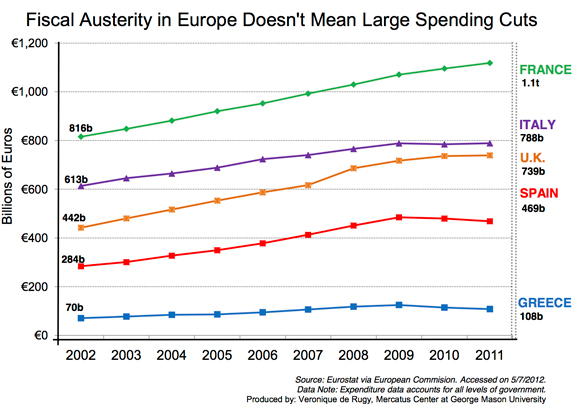For all the gasping about the impact of fiscal austerity on weakened European economies, it’s hard to detect from the actual numbers:

(Image from the Mercatus Center)
See all those coloured lines dropping precipitously? Me neither.
Veronique de Rugy asks where the “savage” spending cuts can be seen:
Austerity is destroying Europe, we are told. In fact, this “anti-austerity” slogan was a big reason for the victory of newly elected socialist François Hollande to the presidency of France. Interviewed in The Economist a few weeks ago, Hollande’s campaign director said “We are not disciples of savage spending cuts.”
But then, I look at the data and I am asking: What “savage” spending cuts?
Look at [the chart above]. It is based on Eurostat data which you can find here. Following years of large spending increases, Spain, the United Kingdom, France, and Greece — countries widely cited for adopting austerity measures — haven’t significantly reduced spending since 2008. As you can see on this chart:
- These countries still spend more than pre-recession levels
- France and the U.K. did not cut spending.
- In Greece, and Spain, when spending was actually reduced — between 2009–2011 — the cuts have been relatively small compared to what is needed. Also, meaningful structural reforms were seldom implemented.
- As for Italy, the country reduced spending between 2009 and 2010 but the data shows and uptick in spending 2011. The increase in spending represents more than the previous reduction.
In addition to failing to curb spending, several governments have raised taxes (which has a negative effect on growth in the economy and can — contrary to popular wisdom — actually reduce the total tax collected as people and companies change their habits to minimize the impact of the tax change).



